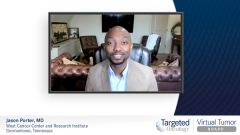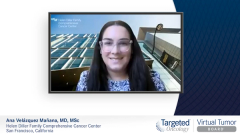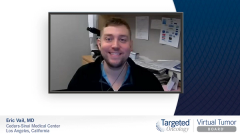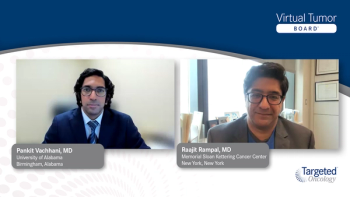
An Introduction to Biomarker Testing in Non-Small Cell Lung Cancer
Expert panelists are introduced and review common biomarkers in non-small cell lung cancer (NSCLC), followed by a focused discussion on EGFR mutations.
Episodes in this series

Jason Porter, MD: Thank you for joining us for his targeted oncology virtual tumor board. In today's presentation, my colleagues and I will read two clinical cases of non-small cell lung cancer; discuss commonly observed targetable genomic alterations; outline approaches to biomarker testing observed racial, age, and socioeconomic disparities and biomarker testing; and we'll share our perspectives on key clinical trial data that may impact our decisions. I'm Dr. Jason Porter. I'm a medical oncologist and hematologist at the West Cancer Center Research Institute, where I'm also the director of the lung cancer disease research group. And today I'm joined by Dr. Eric Vail, if you want to introduce yourself?
Eric Vail, MD: So I'm Dr. Vail. I am a molecular biologist by training, and I am the director of the clinical molecular pathology laboratory Cedars-Sinai Medical Center.
Jason Porter, MD: Awesome. Thank you for joining us, and, also, Dr. Ana Velasquez Manana, if you want to introduce yourself?
Ana Velasquez Manana, MD, MSc: Thank you for having me. I'm Ana Velasquez Manana. I'm an assistant professor at the University of California, San Francisco, and a medical oncologist here, and the assistant director for Diversity, Equity and Inclusion at the Helen Diller Family Comprehensive Cancer Center.
Jason Porter, MD: So we'll just get started talking about non-small cell lung cancer here, genomic targetable alterations. So we look at some of the most common biomarkers in non-small cell lung cancer now. I've considered non-small cell lung cancer to be the, kind of, the poster child for precision medicine and I know everybody thinks that their tumor type is that but in non-small cell lung cancer, we have this exhaustive list, extensive list of different oncogenes that are now targetable and actionable in non-small cell lung cancer. It's really an exciting time to be treating this disease. So we have ALK gene arrangements and infusions; EGFR, where we have first-line therapies in both of those; ErbB2 and HER2, where trastuzumab deruxtecan was recently approved; KRAS, now. G12C is druggable, which it wasn't before, so it's very exciting. MET, NRG1, NTRK1, 2, and 3, RET and ROS1. So all, you know, really exciting that we can target. Most of those in front line, some of those in second line and beyond, but it's just really an exciting time to be treating non-small cell lung cancer. Hopefully, small cell lung cancer will catch up, but obviously not the topic tonight. So here, we look at EGFR mutations that are observed in non-small cell lung cancer. So we have those in exon 18, which are a little less common but actionable - and we can use certain drugs, like afatinib, to target some of those alterations. Exon 19 and 21, the more common EGFR mutations, like L858R, and exon 19 deletions and then, of course, exon 20 insertion mutations, where we have a couple of relatively new drug approvals in those spaces. The exon 20 insertion represents just under 17% of those mutations and the L858R at 41% and exon 19 deletion at about 47%. So, you know, still a host of other kinds of rare mutations, many of which are actionable. The side effects of some of those drugs aren't quite as good as- or the side effect profile isn't quite as good as some of the others when we have a little bit more diarrhea with some of the drugs than we do with others. The more advanced generations of some of those drugs are a lot easier to tolerate, but nonetheless- and EGFR mutated non-small cell lung cancer, we have a lot of options.



















